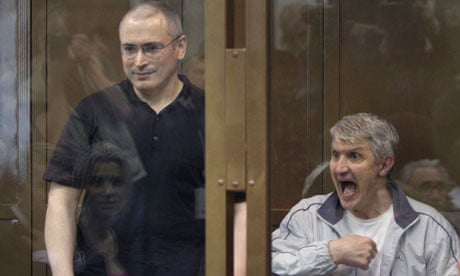A Moscow appeals court has upheld the second conviction of oil magnate Mikhail Khodorkovsky but reduced his jail sentence by a year.
Tuesday's decision means that Khodorkovsky, 47, will remain in prison until 2016, a total of 13 years. He was convicted in December of stealing oil from his own company and laundering the proceeds, a ruling that drew strong international condemnation.
He was seen as a political threat to Vladimir Putin, who was president in 2003 when he was arrested and is now prime minister. In court, Khodorkovsky poured scorn on the judges who had written the verdict, a lengthy summary of the trial that spelled out his guilt.
"From which dusty basement did they dig out the venomous Stalinist spider who wrote that gibberish?" Khodorkovsky asked, visibly agitated as he paced around the glass and steel defendant's cage.
"What long-term investments are we talking about with a justice system like that?
"No modernisation is going to happen without cleaning out these basements."
It represented a bold attack against the court that decided his fate.It also was a barb aimed at President Dmitry Medvedev, who succeeded Putin in 2008 on promises to strengthen the rule of law as part of an effort to modernise Russia's economy and attract foreign investment. His efforts so far have had little effect.
"The president is going to have to make a choice," Khodorkovsky said.
"What does he, Russia, need more: a state ruled by law or the opportunity for de facto extrajudicial reprisals?"
The defence has said the charges against Khodorkovsky and his business partner, Platon Lebedev, reflected a lack of understanding of the oil business, including the payment of transit fees and export duties.
Numerous witnesses, including current and former government officials, testified that Khodorkovsky could not have stolen the oil.
The charges also contradicted the first trial, in which Khodorkovsky was convicted of evading taxes on profits made by Yukos, the oil company he controlled.
"The authors of the sentence made themselves and the whole country look stupid by saying that victims of theft actually profit from it themselves, that it is a crime to strive for higher profits, that the price for oil on the international market should equal domestic prices," Khodorkovsky said.
His eight-year sentence for his first conviction had been set to end in October.
